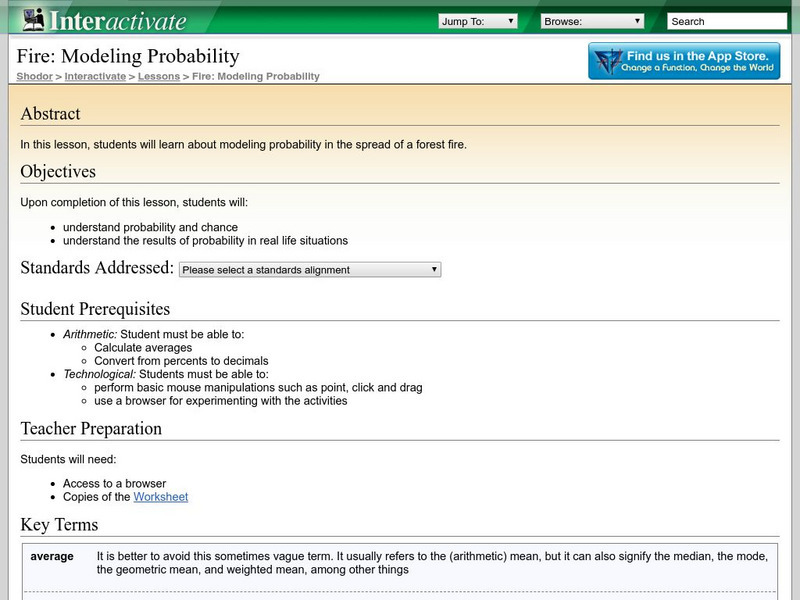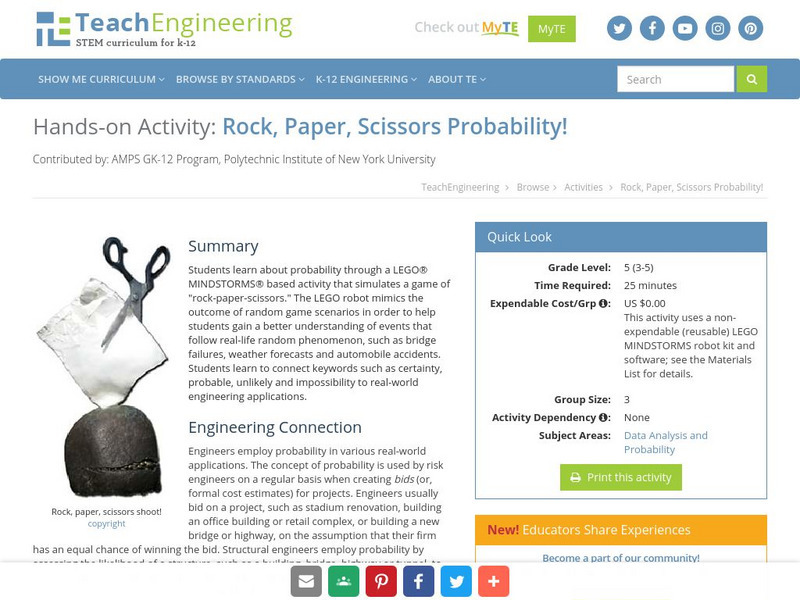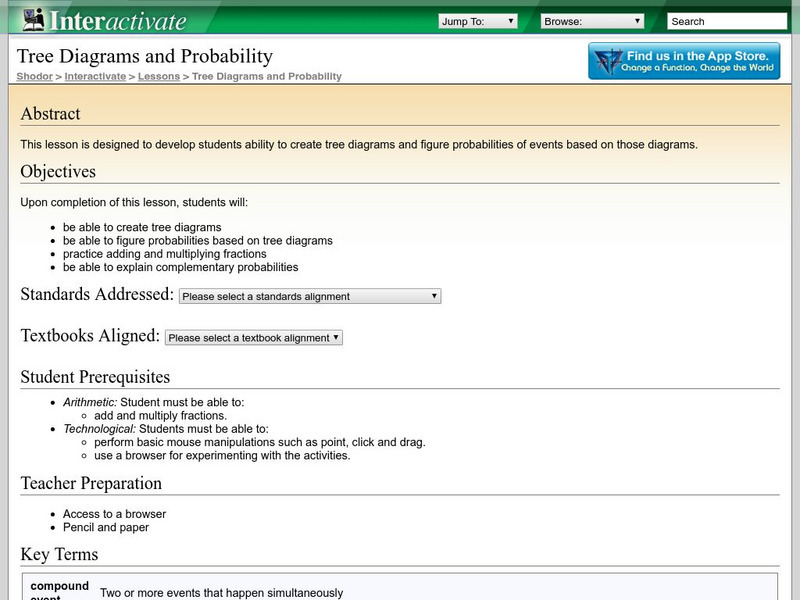PBS
Pbs Learning Media: The Squares Game
In this video segment from "Cyberchase", the CyberSquad determines the fairness of a game in which there are three shapes distributed equally on nine squares. Uses popups, two minutes and 13 seconds.
Shodor Education Foundation
Shodor Interactivate: Lesson: Fire: Modeling Probability
In this activity students will understand probability and chance and understand the results of probability and chance in real life situations.
Science Buddies
Science Buddies: Pick a Card, Any Card
No matter what your favorite card game is, we all wish we could use psychic powers to draw the card we want on our turn. You may not have psychic powers, but you might have the power of probability on your side. Do this experiment and...
McGraw Hill
Glencoe: Self Check Quizzes Analyzing Games
Questions are randomly created to quiz students on probabilities associated with games. Hints and solutions are included.
McGraw Hill
Glencoe: Self Check Quizzes the Language of Chance
Questions are randomly created to quiz learners on the language of chance. Hints and solutions are included.
TeachEngineering
Teach Engineering: Rock, Paper, Scissors Probability!
Students learn about probability through a LEGO MINDSTORMS NTX-based activity that simulates a game of "rock-paper-scissors." The LEGO robot mimics the outcome of random game scenarios in order to help students gain a better...
BBC
Bbc World Service: Figure It Out: Winning the Lottery
The learning activity demonstrates to students real-world applications of mathematics. The resource shows examples of how probability and chance can be used in the real world.
Oswego City School District
Regents Exam Prep Center: Theoretical Versus Empirical Probability
Use this site to learn the difference between theoretical and empirical probability. A practice page is included for each and two teacher resource pages contain classroom activities.
PBS
Pbs Learning Media: When Does 50 50 Become 50 50?
In this video segment from Cyberchase, Bianca goes on a quest to find out if a coin toss really is a 50-50 proposition.
Shodor Education Foundation
Shodor Interactivate: Lesson: Tree Diagrams and Probability
This lesson plan helps young scholars develop tree diagrams and figure probability of events based on diagrams. Lots of resources are available to support teachers and students at this website.
National Council of Teachers of Mathematics
The Math Forum: The Birthday Problem
Dr. Math demonstrates how the birthday problem - what are the odds that two people in a room have the same birthday - works. Several links are available for extended investigations of the problem.
National Council of Teachers of Mathematics
The Math Forum: Drexel University: Boy or Girl?
Dr. Math explores the probability of the children in families being boys or girls. A look at the mathematics involved in each situation is included.
PBS
Pbs Learning Media: Chances Are
Focus on the "language" of probability by listing events from your life that are certain, impossible, likely and unlikely to happen. Determine the likelihood of an event occurring using a probability scale, based on a data set, and by...
PBS
Pbs Learning Media: Hacker's Four Zergen Game
In this video segment from Cyberchase, the CyberSquad determines the fairness of a game in which there are three shapes distributed equally on nine squares.
World Wide School
World Wide School: Etext of Chance a Tale in Two Parts
This site provides the complete etext to Joseph Conrad's Chance--A Tale in Two Parts.
TED Talks
Ted: Ted Ed: Winning at Rock Paper Scissors
Hannah Fry from Numberphile shares a few strategies to help you win your next game of Rock Paper Scissors. [5:48]
Web Center for Social Research Methods
Research Methods Knowledge Base: Sampling in Research
Site discusses the use of sampling in research. The key statistical terms used in sampling are linked for the user to quickly find definitions. The major concepts of probability and nonprobability are also highlighted.
Alabama Learning Exchange
Alex: What's the Chance?
Students engage in opportunities to label events that are likely, unlikely, certain and impossible. This lesson plan was created by exemplary Alabama Math Teachers through the AMSTI project.
Shodor Education Foundation
Shodor Interactivate: Buffon's Needle
Experiment with a simulation to get an approximation of Pi by dropping a needle on a lined sheet of paper.
National Council of Teachers of Mathematics
Nctm: Illuminations: The Game of Skunk
This is a great math game for learners to gain an understanding of experimental probability.
Shodor Education Foundation
Shodor Interactivate: Crazy Choices Game
Compare theoretical and experimental probabilities, using dice, cards, spinners, or coin tosses. Three different probabilities can be compared at once.
Shodor Education Foundation
Shodor Interactivate: Two Colors Applet
Choose one of three boxes and choose one ball from the box to look at conditional probabilities.
National Council of Teachers of Mathematics
Nctm: Figure This: Bowl Em 'Over
Does he have a chance? In this math challenge, estimate Helix's chances of winning the bowling tournament.
PBS
Pbs Learning Media: Probability: Targeted Math
At the end of this lesson, learners will be able to calculate probability for real-life situations.














